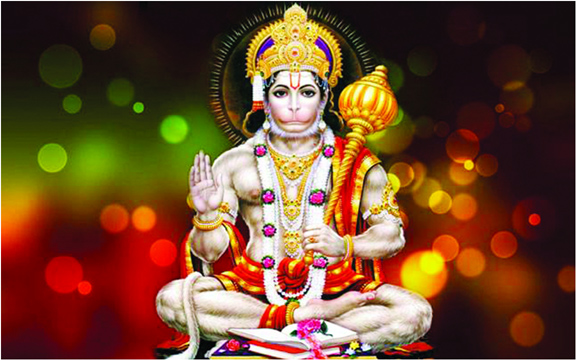
Budhwa Mangal is a day dedicated to Lord Hanuman. This day holds an important place for Hindus. Budhwa mangal is also called big mangal. Lord Hanuman is worshiped on this day.
Budhwa Mangal is on the first Tuesday of Jyeshtha month i.e. 17 May 2022, however, all the Tuesdays coming in Jyeshtha month are called the days of Budhwa Mangal. It is believed that worshipping Lord Hanuman on this day protects us from evil and brings wealth and prosperity. The festival is a symbol of Ganga-Jamuni tehzeeb of Lucknow and said to have originated during the Mughal rule some 400 years ago. Bada Mangal is celebrated every Tuesday during the Hindu month of Jyestha which usually falls during the month of May and June, as per Gregorian calendar.
The Hanuman Temple in Aliganj is the focal point for all devotees. It is because the ritual is said to have started there.
History and Significance
The ”Bada Mangal” has an interesting story behind it. According to historians, the Hanuman temple in Aliganj was constructed by Nawab Saadat Ali Khan in 1798 when his mother Aliya Begum”s prayers were reportedly answered and the Nawab was blessed with a son. Aliya Begum insisted on building the temple and the Nawab complied.
Nawab Wajid Ali Shah, the last nawab of Awadh, continued the tradition by holding community feasts for Hanuman devotees. The Aliganj temple has a star and a crescent on the dome and the ”Bada Mangal” festival is a perfect example of Hindu-Muslim unity.
There are over 9,000 big and small Hanuman temples in Lucknow who open their doors at the stroke of midnight and devotees continue to offer prayers for the entire day.
Celebrations
People flock to the temples in large numbers during early morning and late evening to avoid long queues and heat.
Devotees set up large bhandaras across the city to distribute prasad and jal to everyone. From halwa-puri, aloo-kachori, chola-chawal, kadhi chawal to juice– the bhandaras offer tasty prasad to everyone.
Overall, there are 4-5 Bada Mangal days in the month of Jyestha. Though you may be unable to reach out to temples on the first Tuesday due to coronavirus lockdown, you can still worship Lord Hanuman from your home.
Lord Hanuman is believed to be an incarnation of Lord Shiva. The son of Kesari and Anjana, Hanuman was born on the full moon day during the Hindu month of Chaitra on a Tuesday. Hence, devotees worship Sri Hanuman on Tuesdays. If you were to go by the gregorian calendar, then Hanuman Jayanti would coincide with a day in March or April. Moreover, Tuesdays are called Mangalvar in Hindi, meaning a day of auspiciousness. Interestingly, Hanuman is also called Chiranjeevi, meaning he is immortal. He exists in some form or the other even today.
More revered as the faithful devotee of Shri Rama, Hanuman is known for his strength and knowledge. He is also known as Pavan Putra because the God of the winds carried the blessings of Lord Shiva and conveyed the message about his birth to Mata Anjana.
Also known as Bajrangbali, Hanuman’s unshakable faith in his Lord (Rama) inspires millions of people even today. He epitomises selfless service and devotion. There can be none like him. Here’s a small story that proves his undying devotion for Shri Rama.
After the war against Ravana, Sita returned to Ayodhya with her husband, Rama. They honoured all those who contributed in the battle from their side by giving them a token of thanks. Mata Sita, gave Hanuman, the pearl necklace she was wearing, as a gesture of appreciation for his efforts. Hanuman accepted it respectfully but tore it soon after. Everyone who witnessed Hanuman’s action wondered why he ruined the present given by Sita. But his answer left people speechless. He said that no matter how precious things are, they are meaningless to him if they don’t have Shri Rama. Later, to prove what he meant, he tore his chest apart with his own hands to show an image of his Lord and his consort reflecting gloriously.
One can worship Hanuman during any day of the week, but Tuesdays are considered more auspicious. Hence, people visit temples dedicated to Hanuman on Tuesdays. One can achieve success, peace, happiness, strength and courage by worshipping him.
The reason behind the Lord Hanuman’s name as “Bajrangbali”
Once, seeing Goddess Sita applying sindoor, Lord Hanuman asked her “why does she apply it on her forehead”. To this Goddess Sita replied that “since Shri Ram is her husband, I apply sindoor to wish her long life.” Lord Hanuman thought that if Goddess Sita applied a little sindoor on her forehead, the age of Sri Ram can be prolonged, then if I apply it on the whole body, the life of Shri Ram will increase manifold. Thinking this, he applied sindoor all over his body. As sindoor is also called “Bajrang”, from that day onwards Lord Hanuman came to be called as “Bajrangbali” and that is why whenever he is worshipped sindoor is offered to him.
The Power of Devotion
The character of Hanuman is used in the Hindu religion as an example of the unlimited power that lies unused within each human individual. Hanuman directed all his energies towards the worship of Lord Rama, and his undying devotion made him such that he became free from all physical fatigue. And Hanuman’s only desire was to go on serving Rama.
In this manner, Hanuman perfectly exemplifies ‘Dasyabhava’ devotion—one of the nine types of devotions—that bonds the master and the servant. His greatness lies in his complete merger with his Lord, which also formed the base of his genial qualities.




Be the first to comment